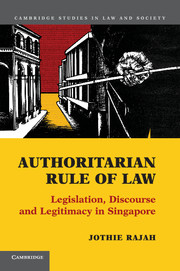From Cambridge University Press
Scholars have generally assumed that authoritarianism and rule of law are mutually incompatible. Convinced that free markets and rule of law must tip authoritarian societies in a liberal direction, nearly all studies of law and contemporary politics have neglected that improbable coupling: authoritarian rule of law. Through a focus on Singapore, this book presents an analysis of authoritarian legalism. It shows how prosperity, public discourse, and a rigorous observance of legal procedure have enabled a reconfigured rule of law such that liberal form encases illiberal content. Institutions and process at the bedrock of rule of law and liberal democracy become tools to constrain dissent while augmenting discretionary political power – even as the national and international legitimacy of the state is secured. This book offers a valuable and original contribution to understanding the complexities of law, language and legitimacy in our time.
Since its publication, Authoritarian Rule of Law has been translated into both Simplified Chinese and Traditional Chinese.

